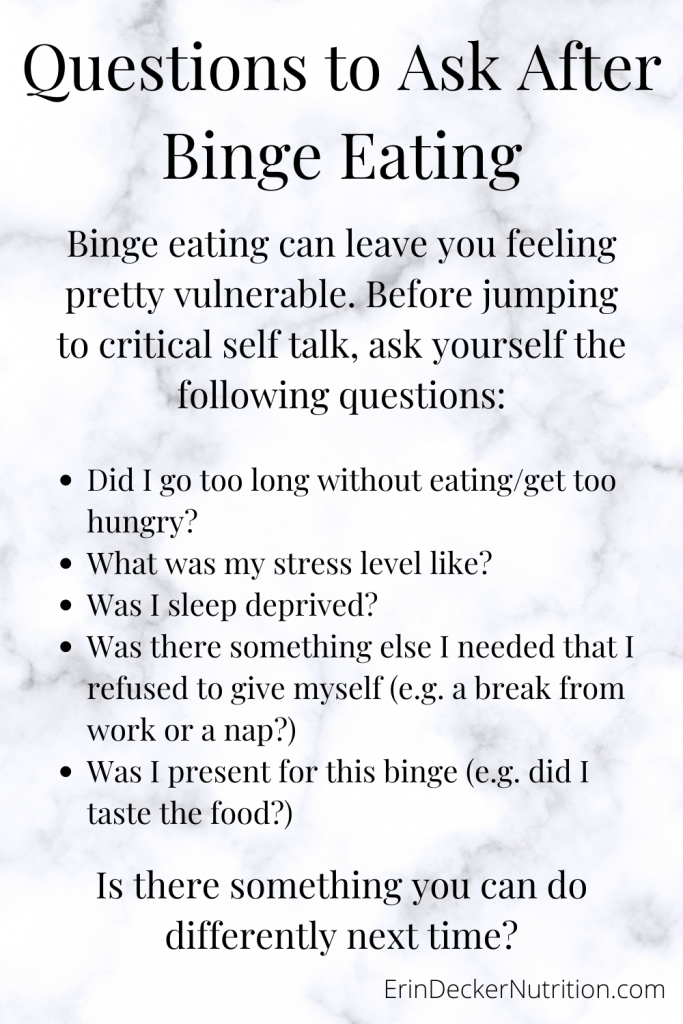Do you find yourself delaying meals as long as possible only to end up polishing off crumbs from dinner over the kitchen sink? Do you feel out of control around food from the moment you start eating? Do you beat yourself up over it day-after-day then commit to do better tomorrow?
If so, you’re not alone! You could be struggling with binge eating.
Keep reading to learn what binge eating is, what causes it, what to do after a binge, and where to go for help.
Table of Contents
What is binge eating?
Binge eating is an eating behavior characterized by eating a significant amount of food in a discrete amount of time with the feeling of being out of control.
A “significant amount of food” is rather vague, but it would be a larger amount than anyone else might eat in the same amount of time (e.g. 2 hours).
This is the clinical definition of binge eating. You could also experience what is known as a subjective binge, in which a smaller or more moderate amount of food is eaten, but it is still associated with the feeling of being out of control.
Binge Eating versus Binge Eating Disorder
Binge eating is a characteristic of both bulimia nervosa and binge eating disorder, both clinically recognized eating disorders.
Binge eating disorder is diagnosed by a mental health professional when the binge episodes meet the following criteria:
- Recurrent episodes of binge eating (involving eating a large amount of food in a discrete period of time and a sense of lack of control over eating)
- The binge eating episodes are associated with at least 3 of the following characteristics: eating much more rapidly than normal; eating until uncomfortably full; eating large amounts of food when not physically hungry; eating alone because of embarrassment; and/or feeling disgusted with oneself, depressed, or guilty
- Significant distress regarding binge eating is present
- Binge eating occurs on average at least once per week for 3 months
- Binge eating is not associated with purging or other compensatory behaviors and does not occur exclusiely during the course of bulimia or anorexia nervosa
[SOURCE]
However, simply experiencing a binge does not mean you have one of these disorders.
Experiencing binge eating is very common among those struggling with their relationship with food and can negatively affect your physical and emotional health regardless of how you label it.
What causes binge eating?
The development of an eating disorder is complex and multi-faceted, meaning no one trigger can be identified as the cause. Contributing factors include genetics, environment, our preoccupation with food and body, and the thin ideal.
Triggers for Binge Eating
Triggers for binge eating are more common and may include dieting history, negative body image, underfueling, food restriction, and labeling of foods as “good” or “bad”.
Dieting, restriction, and undereating are major risk factors for binging.
The reason for this is biological: your body’s main goal is to keep you alive. If you are not getting enough to eat, your brain will fight tooth and nail to get food in any way possible. And when food is finally available, it is common to “panic” and eat significantly more than usual in the event you go a long time without eating again.
So: an awesome drive our brains were blessed with in the event that there is a food shortage. But what about when the restriction is intentional in the form of dieting? Your brain still doesn’t know the difference. All it registers is that you are hungry and now there is food.
Critical Self Talk and Binge Eating
Critical self talk and the labeling of foods as good and bad can further worsen the binge pattern. By beating yourself up over a biologically necessary response to starvation, you are setting yourself up for a subsequent binge.
Thoughts such as “I’m just not disciplined enough” or “I can’t control myself” can lead to all-or-nothing thinking, such as “might as well finish this bag” or “what’s the point, I’ll never be healthy”.
Binges often accompany feelings of guilt and shame and usually end with a promise to do better tomorrow. This promise to do better further strengthens and validates the binge, because your brain knows that more restriction will follow the next day. This is known as the dieting cycle.
What to do after a binge
Binging can leave you in a pretty uncomfortable state, both physically and mentally. The first thing you’ll want to do is take a DEEP breath and practice self-compassion.
Self-compassion is the act of being kind to yourself in moments of distress, rather than playing the blame and shame game. No, the binge was not your fault! Your body was designed to do this, either to find you food or to process a difficult emotion.
Next, ask the inner critic to step aside while you investigate what happened with a curious, open mind. You want to find out if you were vulnerable to a binge.

Questions to ask after a binge
- Did I go too long without eating/get too hungry?
- What was my stress level like?
- Was I sleep deprived?
- Was there something else I needed that I refused to give myself (e.g. a break from work or a nap?)
- Was I present for this binge (e.g. did I taste the food?)
(Adapted from Tribole and Resch, 2017)
If you answered YES to any of these questions, ask yourself what you could do differently next time. For some this might mean eating more food or eating more consistently, finding additional coping mechanisms for stress, prioritizing sleep, or honoring your limits.
As far as what NOT to do after a binge? Avoid making promises to do better the next time, or falling back into a restrictive eating pattern the next day. “Making up” for the binge will strengthen its power over you and set you up for another one.
Where to get help for binge eating
Binge eating is often psychologically AND physiologically driven. It’s important to find support from someone who understands both of these elements. For most, that means working with a qualified mental health counselor and registered dietitian.
Binge eating disorder requires a multidisciplinary approach including a dietitian and counselor as well as a medical provider.
The following resources may be helpful
Looking to build your team? Erin is a Health-at-Every-Size-aligned registered dietitian with experience in helping individuals overcome binge eating, emotional eating, and disordered eating. She serves the Raleigh-Durham area and the rest of North Carolina via telehealth. Schedule an appointment today!

I can’t agree enough with the importance of being kind to oneself after a binge. It’s important to not beat oneself up over it, but rather figure out ways to prevent the issue moving forward.